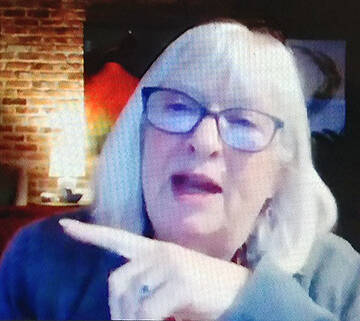Mary Woodward said at a recent online forum that her parents didn’t necessarily think they were being courageous when they stood up against the concentration camps for Japanese Americans during World War II.
“They did what was right for the island,” she said at the “Courage in Journalism” panel discussion.
Woodward is the youngest daughter of Walt and Milly Woodward, publishers of the Bainbridge Island Review at the time. She said they stayed up all night Dec. 8, 1941, to put out the only EXTRA in the paper’s history. “They thought what the community thought,” she said, adding, “I don’t know if they changed too many people’s minds.”
Likewise, Becky Fox Marshall said she didn’t think it was necessarily courageous to speak out against a white supremacy group that wanted to locate on the island in the early 1990s. We were just trying to “keep hate out of our community.”
Steve Powell, the paper’s current editor, said he hasn’t done anything that courageous in his two years here. But he’s had plenty of hate thrown at him in his almost 40-year career. “You can’t be intimidated.” He joked that there is so much scrutinizing of the paper now that every day it takes courage.
Moderator Linda Kramer Jenning, a veteran journalist who has taught at Georgetown and worked on national magazines, said journalists worldwide put themselves at risk to “try to tell us what’s going on.” Some in Ukraine have even lost their lives.
She said a free press and informed citizenry is important to democracy, but, despite that, journalism has shed half of its employees since 2008. Hundreds of papers have shut down, and those still operating have fewer pages and less news. Many communities are left without a reliable local news source, but this area is lucky to still have the Review, she added.
They were fortunate during World War II also. Jenning said thanks to the Woodwards, Review readers were able to keep in touch with their Japanese American friends in the concentration camps, finding out when they got married or had a baby so when they returned they still would be part of the community. Still, there was some discrimination when the internees returned. Some of it was in the form of silence. Jenning said part of journalism is to break that silence.
Powell said the media has been silent too long regarding racism. Even being a newsman he said he was ignorant on the topic, thinking things have been getting progressively better for decades. He said Black Lives Matter and Critical Race Theory helped open his eyes. “I’m amazed at the way people are still being treated. Stories that were kept secret are now coming out.”
Jenning said for years objectivity and fairness were benchmarks of journalism. But she wonders when society is better served by journalists taking a stand.
Woodward said that’s what editorial pages are for — opinions. She still believes in reporting as objectively as possible.
Powell agreed. He said people see too much biased information all over the place, especially social media. He said he still tries to report the whole issue, within reason. If something really is “ridiculous” he often buries it at the end of a story.
“The only way to learn about how horrible an organization is is to be informed about it,” he said. If we know about a hate group, for example, we can warn our children not to associate with anyone who thinks or talks that way.
Marshall said in dealing with the white supremacists, “All the light would make them shrivel up” when letting others know about them.
Trust also is an issue, Jenning said. With the internet, people are always harassing the media. “It’s a whole other level of intimidation and threats that journalists face.”
Woodward wondered that with Donald Trump no longer president if the media might be trusted again. But it started way before Trump, Marshall said.
Jenning agreed, saying, Journalism is not always a shining example.” She reminded everyone of Yellow Journalism and, of course, the anti-Japan sentiment during the 2nd world war. “It was horrible,” including the Seattle papers, Woodward said.
Marshall said when she got into journalism it was right around Watergate and “All the President’s Men.” It was a noble profession. “Now it’s down with used car salespeople. Or lawyers,” Marshall, then Jenning, joked.
Marshall said she had more issues with the public over developments or during BI’s annexation than she did with the hate group. “No one spoke on behalf of the hate group,” she said. “People didn’t question your motives. That’s not true anymore. It requires even more courage now.”



